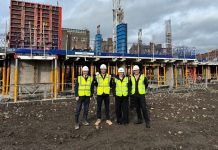The Autumn edition of the London Development Barometer (LDB) survey has found that 59% of the respondents believe that staying in the EU would be the most advantageous outcome to London development activity. The survey was administered in October 2019, at a time when the U.K. government was attempting to negotiate a revised Brexit deal before the October 31st deadline. In this context, 23% of the respondents indicated no preference to staying in the EU, leave with a deal or leave without a deal, as long as some clarity is achieved. Just 5% believed London’s development activity is best served by a no deal Brexit.
The LDB was launched in Autumn 2017 to gauge industry sentiment across a number of factors affecting London development activity. Although fears around Brexit have allayed since then, Brexit has consistently been cited as the one of the industry’s top two concerns. 76% of the respondents still believe that the former will have a negative impact on London development activity, compared to 80% two years ago.
This reflects the industry’s glum outlook on the benefit of the Article 50 extension six months ago. At that time, 48% of the respondents did not believe the extension would lead to a better deal, while 36% did. Almost 60% agreed the ongoing uncertainty would have a negative impact on development activity, while 13% foresaw a positive impact.
Nonetheless, the industry’s overall cautiousness surrounding London development activity has levelled with 43% believing there will be less development activity in the next five years, compared to 46% a year ago and 57% two years ago. That is despite bolstered industry concern with a number of factors relating to the development finance landscape in the last six months.
The ongoing parliamentary impasse has caused both the Bank of England and British government to downgrade its economic forecasts, while geopolitical conditions have contributed to an increasingly unsettled global marketplace, reflected in a downward adjustment in global growth forecast by the International Monetary Fund.
Fears around the global economy and global politics have heightened as a result. 63% believe the global economy will have a negative impact on development activity, increasing from 52% six months ago and 42% one year ago. Meanwhile, 57% believe global politics will have a negative impact, compared to 48% six months ago and 50% a year ago.
In this context, the industry has become more concerned with the development finance climate and foreign investment. Just 42% believe inward investment levels will either increase or stay the same, compared to 64% six months ago and 51% one year ago.
71% believe finance will become more expensive, compared to 65% months ago. Only 27% believe there will be an increase in the availability of finance, compared to 37% six months ago, and 42% of respondents believe the changes to the availability of finance will have a negative impact on development activity. 54% believe the same of the changes to the cost of finance.
Despite this, the industry is no more concerned about the impact of cost and availability of finance than before. 63% predict construction costs will have a negative or significantly negative impact, compared to 68% six months ago.
The industry believes that government investment would help development activity with 65% predicting a positive or significantly positive impact. 68% believe the same of Crossrail, although that is down by 10% in the year.
Confidence in market demand also remains positive. 89% and 85% predict an increase in demand for senior living and affordable/council housing, increasing by 5% and 11% in the last six months, respectively. 78% continue to predict an increase for Build to Rent, while confidence in all other sectors were positive on balance.
Retail remains the exception, with an overwhelming 86% predicting a decrease in market demand, and just 3% predicting an increase. Several respondents have noted that repurposing vacant retail units are as a result on the rise.
The industry’s view of government remains overwhelmingly dim, with 80% believing they are not doing enough to enable development in the capital Improving the town planning processes continues to be the industry’s top priority for government, with calls to mitigate the Brexit transition period in second place and funding for local authorities, infrastructure and housing delivery in third.
Richard Hollingworth, director, M3 Consulting:
“Investment in London real estate driven by global capital flows and supported by ongoing currency plays remains strong. However, the results of our latest survey indicate that the industry is braced for a more challenging environment for development finance and costs, as it calls for the government to focus on improving town planning processes, sort out Brexit and invest in infrastructure.“






















